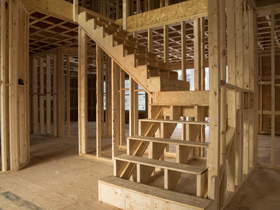
Ask Amy
Here are my straightforward answers to questions I have received for buying and selling homes in the NC Triangle area.
Answers for people considering buying a new construction home
Dear Amy,
My spouse and I are thinking about building a new home in central NC. We have heard that the Pandemic caused some issues with new construction. We were wondering if you could provide some insights into what's currently happening in the new construction market.

If you are thinking about buying a new construction home in the Triangle area, it is an exciting journey and there are several important things you should know before getting started.
New construction is experiencing some changes, especially in response to the pandemic:
- Fewer Supply Chain Issues: There are fewer supply chain issues causing delays in construction, making the process smoother.
- Decrease in Multiple Offer Situations on Homes to be Built: With a more stable market, multiple offer situations are becoming less common, but still occur in a few high-demand neighborhoods.
- Higher Builder Deposits: Builders are trying to get higher deposit amounts from buyers at the time the contract is signed than before the pandemic. Builder deposits are non-refundable so buyers need to be aware of that when they are considering buying new construction. Buyers who aren’t sure of their employment situation, such as how much of their work time needs to be in the office, or buyers whose cash is tied up in retirement accounts or in their current home’s equity need to be prepared to financially commit when buying new construction.
- Growing Demand: The Triangle area is still in need of new homes due to its continuous growth, leading to the development of many new neighborhoods. Development is taking place throughout the area and is not limited to any particular city or suburb. In the urban areas, we are experiencing infill construction, which is when new homes are built to replace smaller, older homes, and we are seeing larger lots being subdivided so more than one home can be built.
- Fewer Contingencies: Most builders stopped accepting contingencies before the pandemic. A contingency is when a buyer has a home to sell before they can close on the purchase of their next home. Contingencies normally require the buyer to sell their current home by the time the new home is finished getting the drywall (walls) installed. Builders now expect buyers to have their home sold before they go under contract, to be able to qualify to close without selling their current home so a contingency isn’t needed or to work with a company that will help the buyer bridge the gap financially between their current home and the new home. The term ibuyers is a generic term for those types of companies, but the way those companies work can vary, and the cost to work with them varies as well.
Dear Amy,
I am ready to move and would prefer to buy a new home. Why would I need a real estate agent when purchasing a new construction home? Can't I just work directly with the builder? What advantages does having a buyer’s agent provide?

There are many advantages to having a buyer’s agent when you purchase new construction. Here is a list of the advantages:
- Guidance and Advocacy: A good buyer's agent will ask the right questions on your behalf, advocate for your best interests, and ensure you are able to make informed decisions throughout the process.
- Builder's Representative vs Buyer's Agent:to their employer, the builder, and not to you. Also, they may not have the same legal disclosure obligations to you as a licensed real estate broker. Builder representatives will ask you for your personal information which puts you at a disadvantage during negotiations. If you hire a buyer’s agent, they will provide only the information needed, and nothing additional.
- Communication: Buyers often face communication challenges with builders and their representatives or salespeople, leading to misunderstandings about structural design options and upgrades. A buyer's agent can ensure clear communication and help negotiate important details. Larger builders have online registration forms, or an online person reaches out via phone, email, or online website chat to collect your personal information, and they often don’t know anything specific about that neighborhood/subdivision. Their role is just to set an appointment for you with the builder’s representative for that community. A buyer’s agent can save you time while skipping that unnecessary and annoying step.
- Understanding Costs: You need to know what the final purchase price will be before you sign a purchase agreement and give the builder a deposit. Most builder websites say phrases such as “Prices starting from $_______” or “_______ floorplan price is $_______ to $_______ with a $50,000 range”. Without a buyer’s agent’s guidance, new home buyers may choose a floorplan or lot that is out of their budget, and have to start over and choose a smaller floorplan or a different lot.
Navigating the selection of upgrades and finishes can be overwhelming. A buyer's agent should provide guidance on selections that add long-term value versus those that simply increase the builder's profit margin. Selections include both structural options such as a screened porch or fireplace, and cosmetic choices such as flooring, kitchen appliances, and bathroom tile. - New Construction Financing Incentives: Many builders offer incentives to new home buyers. Sometimes those incentives are worthwhile, but other times they are not as good as they initially appear. A buyer’s agent can help you understand when in the new construction process to negotiate on those, and how to evaluate the builder’s financing incentives to make sure you are getting the best deal.
- Zoning and Land Considerations: The builder’s representative and the builder’s marketing materials for the neighborhood are often not to scale, so it can be confusing as to the amount or size of wooded areas in the community, and what you actually own compared to areas owned and controlled by the homeowner’s association (HOA). In some areas, the developer, who can be different from the builder, is trying to buy more land but does not currently own it. A good buyer’s agent will ask the right questions regarding land adjacent to the community. You should ask your buyer’s agent if the builder representative’s response can be verified by other sources because builder representatives are often sharing information scripted to them by their manager, rather than information they have personally researched and verified.
A buyer's agent can help you understand how zoning and adjacent land may impact the resale value of your home. If the land beside or behind your new home is undeveloped and not owned by the HOA, you need to be aware that at some point in the future, something might be built on that land. Property can be rezoned in NC so current zoning could change in the future. - Understanding How a Builder’s Contract Differs From the NC Standard Resale Contract: Builder contracts are often very long, complicated, and favor the builder. A buyer's agent can help explain the language to help you understand the details. In NC, attorneys are not required to review a home contract, so as soon as the Buyer and Builder sign the contract, it is a legally binding agreement. A builder contract is usually written by the builder’s attorney and varies significantly from the NC Offer to Purchase and Contract form approved by the NC Bar Association.
A buyer’s agent will point out to you on the builder contract whether any of your builder deposit(s) are refundable, and under what circumstances they might be refundable.
Builder contracts usually have a number of disclosures and addenda attached. It is important to review all of this and ask questions prior to signing anything. Most builder purchase contracts are electronically signed, so you want to ask for the opportunity to review the lengthy documents before you are asked to electronically sign them. You want to have time to review it on your computer or a larger screen rather than reading it as you’re signing it.
Triangle Area New Construction Homes
Dear Amy,
I’ve done a lot of research and I have decided I want to build a home. I have done online research on the reputations of builders and looked at floorplans on some of their websites. How do I get the best deal from the builder?

Whether you are looking to buy a completed new home or want to build from the ground up, having a buyer’s agent is how you make sure you know all of the information to be able to get the best deal from the builder.
The information on the community or builder’s site is often not fully up to date. There could be an offer submitted on a home or lot that shows available on their website, in which case you would need to decide quickly whether you should make an offer. Your buyer’s agent can make sure the on-site representative is sharing the deadline for incentives, and if they have any idea what the next incentive package might be.
You might get on a builder’s website to do research and end up chatting with an online consultant where they have you sharing personal information that maybe you shouldn’t share before you know more about the neighborhood. The online sales consultant doesn’t know much about the neighborhood and is just a gatekeeper before talking to the actual neighborhood sales representative. These self-help tactics can lead to trouble for buyers; little do you realize that you just fell into the builder’s sales funnel. The more inquiries they get, the more marketing they do to make you have FOMO - fear of missing out.
In popular neighborhoods, buyers see many people at the model home or wandering around, and feel a sense of urgency. The builder representatives use this to sell more homes. This tactic is particularly common with builders who use VIP lists before public sales start in a new construction neighborhood, or before the model home is open to walk through.
In some new home communities, the “on-site agent” is not even a licensed real estate agent, so they can operate under different rules and laws.
This is where expertise comes in, and an experienced buyer’s agent will know what to say and when to say it, so you can get the best deal.
Amy Shair's expertise is backed by numerous professional certifications, showcasing her commitment to excellence in real estate.

Dear Amy,
I want to buy a new home in a neighborhood that doesn’t have an Homeowners Association or HOA because I had a really bad experience in the past. How do I find neighborhoods in the Raleigh-Durham area that don’t have an HOA?

I get many requests to help buyers find a home that does not have an HOA because of the fees, or like you, people have had a bad experience dealing with an HOA. The best way to build without any HOA is to build on land that has no restrictive covenants and is not in a subdivision.
If you place a high importance on owning property without restrictive covenants and without an active homeowners association, a buyer’s agent can search the MLS listings to find properties without them. If you are searching online and see a property that has any type of HOA fee listed, that means there is an active HOA in place for that property.
Most of the new construction in the Triangle area is developed with restrictive covenants because developers buy larger tracts of land and subdivide the property and have to get the utilities and streets approved by the county or city/town and get the road and lots ready for the builder. The cost of going through that process, including installing roads does not make sense unless the developer can be sure they can make a profit on selling the lots, or being able to build profitable homes themselves on the lots.
Having restrictive covenants does not mean there is an active Homeowners Association. Restrictive covenants usually put limitations on the type of construction allowed (manufactured, modular, or site built) and the minimum size of the living space to help maintain consistency when the properties were sold with the intent for houses to be built on them.
An active homeowners association is the first step in making the covenants enforceable without having to hire an attorney. Homeowners associations can be managed by property owners, or the owners can hire a property management company who works with the property owners and the Board of Directors to run the neighborhood and keep homeowners in compliance with the restrictive covenants and any other rules and regulations that have been put in place, including animals, fencing, and parking.
Let me know if you would like to discuss HOAs and restrictive covenants for your Triangle area home search.
What question can Amy answer for you?









